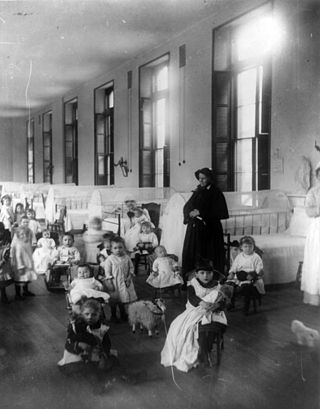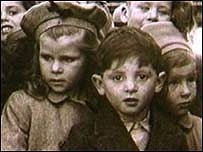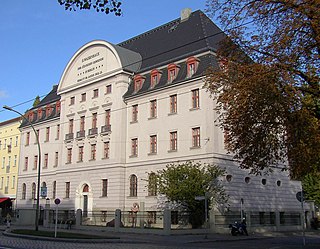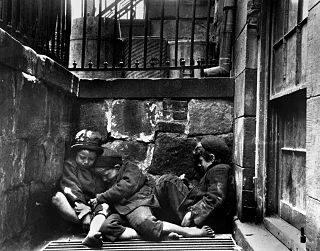
Adoption is a process whereby a person assumes the parenting of another, usually a child, from that person's biological or legal parent or parents. Legal adoptions permanently transfer all rights and responsibilities, along with filiation, from the biological parents to the adoptive parents.

An orphanage is a residential institution, total institution or group home, devoted to the care of orphans and children who, for various reasons, cannot be cared for by their biological families. The parents may be deceased, absent, or abusive. There may be substance abuse or mental illness in the biological home, or the parent may simply be unwilling to care for the child. The legal responsibility for the support of abandoned children differs from country to country, and within countries. Government-run orphanages have been phased out in most developed countries during the latter half of the 20th century but continue to operate in many other regions internationally. It is now generally accepted that orphanages are detrimental to the emotional wellbeing of children, and government support goes instead towards supporting the family unit.

Foster care is a system in which a minor has been placed into a ward, group home, or private home of a state-certified caregiver, referred to as a "foster parent", or with a family member approved by the state. The placement of a "foster child" is normally arranged through the government or a social service agency. The institution, group home, or foster parent is compensated for expenses unless with a family member.
Holt International Children's Services (HICS) is a faith-based humanitarian organization and adoption agency based in Eugene, Oregon, United States, known for international adoption and child welfare. The nonprofit works in thirteen countries, including: Cambodia, China, Colombia, Ethiopia, Haiti, India, Mongolia, Philippines, South Korea, Thailand, Uganda, Vietnam, and the United States. This work includes a range of services for children and families including efforts in nutrition, education, family strengthening, orphan care, foster care, family reunification, and child sponsorship. The organization's stated mission is to seek a world where every child has a loving and secure home.
In the United States, adoption is the process of creating a legal parent–child relationship between a child and a parent who was not automatically recognized as the child's parent at birth.

The Adoption and Safe Families Act was signed into law by President Bill Clinton on November 19, 1997, after having been approved by the United States Congress earlier in the month.
In clinical diagnostic and functional development, special needs refers to individuals who require assistance for disabilities that may be medical, mental, or psychological. Guidelines for clinical diagnosis are given in both the Diagnostic and Statistical Manual of Mental Disorders and the International Classification of Diseases 9th edition. Special needs can range from people with autism, cerebral palsy, Down syndrome, dyslexia, dyscalculia, dyspraxia, dysgraphia, blindness, deafness, ADHD, and cystic fibrosis. They can also include cleft lips and missing limbs. The types of special needs vary in severity, and a student with a special need is classified as being a severe case when the student's IQ is between 20 and 35. These students typically need assistance in school, and have different services provided for them to succeed in a different setting.
Child protective services (CPS) is the name of an agency responsible for providing child protection, which includes responding to reports of child abuse or neglect. Some countries and US states use other names, often attempting to reflect more family-centered practices, such as department of children and family services (DCFS). CPS is also sometimes known by the name of department of social services, though these terms more often have a broader meaning.
Adoption in Australia deals with the adoption process in the various parts of Australia, whereby a person assumes or acquires the permanent, legal status of parenthood in relation to a child under the age of 18 in place of the child's birth or biological parents. Australia classifies adoptions as local adoptions, and intercountry adoptions. Known child adoptions are a form of local adoptions.
'Najlah Feanny (1961), or Najlah Feanny Hicks is an American photojournalist and former Newsweek Magazine contributor. Feanny covered politics, the American landscape, breaking news, feature stories, as well as documented stories in dozens of countries around the world. Feanny's images are represented by Corbis Images. She has set up projects and organizations to help vulnerable young people: the Heart Gallery of New Jersey, Do1Thing, and Design for Social GOOD.
The Sixties Scoop, also known as The Scoop, was a period in which a series of policies were enacted in Canada that enabled child welfare authorities to take, or "scoop up," Indigenous children from their families and communities for placement in foster homes, from which they would be adopted by white families. Despite its name referencing the 1960s, the Sixties Scoop began in the mid-to-late 1950s and persisted into the 1980s.
Joint Council on International Children's Services, founded in 1976, was a nonprofit child advocacy organization based in Alexandria, Virginia. The organization "work[ed] to end the suffering of children who live every day without the protection and love of a strong permanent and safe family. Our 142 Partners in 52 countries do the same."

Deinstitutionalisation is the process of reforming child care systems and closing down orphanages and children's institutions, finding new placements for children currently resident and setting up replacement services to support vulnerable families in non-institutional ways. It became common place in many developed countries in the post war period. It has been taking place in Eastern Europe since the fall of communism and is now encouraged by the EU for new entrants. It is also starting to take hold in Africa and Asia although often at individual institutions rather than statewide. New systems generally cost less than those they replace as many more children are kept within their own family. Although these goals have been made internationally, they are actively being working towards as reform and new reforms are put into practice slowly as is fit for each country.
The Children's Act, 2005 is an act of the Parliament of South Africa that consolidates and reforms the law on matters related to children. It deals with topics including the age of majority, paternity, custody, child support, guardianship, parenting plans, children's courts, circumcision, day care, child protection, foster care, group homes, adoption, surrogacy, child abduction, and trafficking of children.
The Ministry of Children, Seniors and Social Development is a provincial government department in Newfoundland and Labrador, Canada. The department is headed by a member of the provincial cabinet, typically a Member of the House of Assembly, who is chosen by the premier and formally appointed by the Lieutenant-Governor of Newfoundland and Labrador.
The following outline is provided as an overview of and topical guide to adoption:

Foster care is the term used for a system in which a minor who has been made a ward or a non-minor, typically aged 18–21, who volunteers for placement, is placed in a relative placement, a non-related extended family (NREFM) placement, a community family home, an institution, or a group home. Relative, NREFM, and community caregivers certified by the state are typically referred to as "foster parents," "kin caregivers," "resource parents," or other local terms. The placement of the child is usually arranged through state or county social services. The institution, group home, or caregiver is reimbursed for the expenses related to caring for the child. The state via the family court and child protection agency stand in loco parentis to the minor, making all legal decisions, while the caregiver is responsible for the day-to-day care of the minor. Even while their child is in Care, typically birth parents retain Education and Medical rights and the right to contact with their child unless parental rights are terminated by the Court.
North Carolina LINKS is a program of the North Carolina Department of Health and Human Services, Division of Social Services.

David Meade is an American politician and Republican member of the Kentucky House of Representatives representing Kentucky's 80th House district since January 2013. His legislative district includes Garrard and Lincoln Counties as well as part of Pulaski County. Meade serves as Speaker pro tempore of the Kentucky House of Representatives, a constitutional office and the second-highest position in the 100-member legislative chamber.
Lily Nie is the founder of Chinese Children Adoption International, which has overseen the international adoptions of over 10,160 Chinese children. She was inducted into the Colorado Women's Hall of Fame in 2008.






